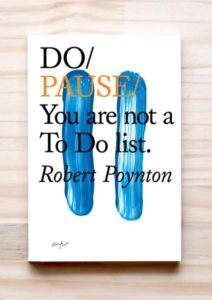 DO PAUSE – You are not a To Do list.
DO PAUSE – You are not a To Do list.
By Robert Poynton
Published by The Do Book Company
Spring 2019
£8.99 paperback original (£5.49 ebook) Photography by Jim Marsden
Buy the book here: https://thedobook.co/
Do Pause: An array of ideas for mixing up the rhythm of your life. Review by Catherine Carver
Robert Poynton’s ‘Do Pause’ is in many ways a timely book. Pandemic life has meant a disruption to the normal rhythm of life for most of us (though ‘pause’ might feel like the wrong term for those whose work and family lives now chaotically collide). Poynton’s pause is meant to be a conscious choice, but lockdown life may have served as an impetus to think about whether you’d like to try introducing conscious pauses in the longer term. He advocates the pause as a means to facilitate creativity, to enable serendipity and ‘eureka moments’ and to push back against the fetishizing of productivity (a point demonstrated by early lockdown tweets about what Shakespeare accomplished during the plague).
Do Pause serves as a reflection on the need for pauses as well as offering a plethora of suggestions for how to go about introducing them – from counting to one before entering a room to taking a sabbatical. It is a short, easy read, peppered with real world anecdotes from Innocent’s team away day to olive harvesting in rural Spain to the Burning Man festival in Nevada. I found there was a bias towards examples from improv and executive training, which makes sense given Poynton’s background in improv workshops and working as an Associate Fellow at the Said Business School at Oxford University. However, by having it largely grounded in real world examples rather than just conceptual pontification I found it engaging.
For me, Poynton was like having a kind, interesting friend bringing a perspective at odds with my own. I am more ‘Do Do’ than ‘Do Pause’, and by the end I wasn’t necessarily a card-carrying convert, but I was left curious enough to want to dabble in pauses and try some of the little, low commitment experiments he suggests like breathing or walking round the block.
My only lingering concern with the book was that I was left questioning whether some of the ideas around pausing necessitated a certain level of privilege. To be able to walk slowly when late for a meeting or extend your commute by walking to work with colleagues or take a week out to think about big issues (a la Gates) or only volunteering a thought if it comes back round three times necessitates a degree of privilege. It assumes a degree of ownership of your time that not everyone has – be that due to their status or precarity at work, family commitments or economic necessity. I have no doubt executive leaders have a multitude of demands on their time, but I also suspect they are more likely to have a degree of autonomy that is not available to us all.
But, that said, there are enough ideas that you can likely find some ways of pausing that work for you. So, if you’re looking for actionable ideas to change up the rhythm in your life, this easy read is worth a look.
For further information on this title and to request pdfs or an interview with the author, please contact Fiona Smith: fiona@smithandbaxter.co.uk 07831 193250


Recent Comments